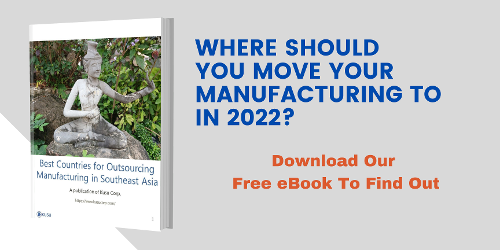A key aspect of a manager’s job is to manage risks but as we all know trying to predict and...
Skills For Successful Purchasing Managers In 2022
The COVID-19 Pandemic has wreaked havoc on global supply chains. In previous articles, we have discussed the current state of and likely outlook of supply chains, as well as the chip shortage and shipping difficulties.
In this week’s article, we will be discussing the impact the Pandemic has had on purchasing and purchasing managers, another profession under tremendous pressure due to the Pandemic. More specifically, we will be discussing the skills purchasing managers must have in these trying times.
Skills include: Organisational skills, relationship-building, negotiating skills, farsightedness, industry expertise, capacity for risk assessment and mitigation, alignment with company goals.
.png?width=600&name=Untitled%20(600%20%C3%97%20350%20px).png)
Organisational Skills
First and foremost, purchasing managers must be able to create organisation among inter-departmental teams. They must be able to create a proper structure and direct relevant teams towards key priorities. They must also be comfortable in managing employees, monitoring their activities, and coordinating teams of employees, regardless of the department employees belong to.
Aforementioned activities must, of course, be in line with company-allocated budgets and/or proposed purchasing manager-drafted budgets, writes Indeed. This is especially important Post-COVID, wherein budgets have shrunk due to more limited profits. Therefore, there is a greater need to remain organised and to set the right priorities as there is less room for error.
Relationship-Building
Relationship-building with relevant external parties (e.g., Existing and potential suppliers, vendors, clients, etc.) is absolutely necessary, states the Chartered Institute of Procurement & Supply. The Pandemic and supply chain disruptions have made it abundantly clear that the relationship between companies and external parties need to be solid, and both must be able to properly rely on another so as to limit any further disruptions.
Additionally, aforementioned organisational skills hinge upon purchasing managers’ relationship-building skills with peers and employees. After all, purchasing managers need to have constant knowledge and awareness of company purchasing needs which can only be maintained through effective communication and relationships.
Negotiating Skills
The foundation of any strong relationship is obviously relevant parties’ negotiating skills. Relevant parties are unable to help one another, let alone form relationships, without first understanding the needs of one another.
Adequate negotiating skills can help ensure your company can “negotiate and agree contracts, monitoring the quality of service provided… in order to get the best price and value for money,” according to Prospects.
Again, Post-COVID budget restraints are likely to continue whereas supply chain shortages have led to price increases for specific components. Both ensure negotiating skills will be critical.
Farsightedness
In this context, farsightedness refers to the ability to see the big picture, the ability to foresee potential trends in the future, or perhaps even the ability to understand the implications of key decisions. Indeed refers to this skill as “sustainability.”
They state the following: “if a department has a quota of items each month, a purchasing manager ensures that the department has enough materials to produce and test that quota… Purchasing managers may create surplus orders for materials if they expect a higher quota… They practice sustainability management to understand when they may need to purchase goods, and when they can rely on their current surplus amounts.”
The COVID-19 Pandemic has made it evident that past “Just-in-Time” Production Models are no longer viable. Surplus needs to be maintained to prevent shortage. Shortage could arguably even be prevented with greater priority on farsightedness and less on cost-saving.
Industry Expertise
Farsightedness would be impossible without industry expertise. After all, purchasing managers often operate in fast-moving industries such as engineering and construction, and information and communications technology, according to Prospects.
Innovation occurs at a blistering pace in these industries. Purchasing managers must be able to keep up to pace with these innovations and adjust purchasing to suit new industry and company innovations.
Research and data analysis are therefore two skills that fall under the larger umbrella of “industry expertise.” However, industry expertise is also built on experience and specialisation, writes ZipRecruiter.
Risk Assessment and Mitigation
No matter how far into the future or much of an industry expert a purchasing manager is, all strategies require contingencies. The Pandemic is evidence of this. Purchasing managers must be able to assess for any and all possible risks and develop contingencies.
Additionally, “Having effective risk management skills can help purchasing managers predict, manage and avoid risk situations within a department. They may manage risk exposure by choosing company-aligned clients, tracking investments, understanding pricing and evaluating digital risk factors,” write Indeed.
Alignment with Company Goals
All aforementioned skills purchasing managers must possess in 2022 must be built around company goals. All actions, plans, and contingencies, must be done with company goals in mind. Procurement managers must be able to adjust to new goals while at the same time offering insight in terms of how purchasing can aid larger company goals.
No activity can jeopardise company goals. Constant communication with other managers and departments to ensure actions do not jeopardise and align with company goals. Again, purchasing and procurement is a multi-department undertaking and never occurs in isolation.
Conclusion
The role of purchasing manager was never an easy role to begin with. The COVID-19 Pandemic and the uncertainty and chaos it brought has only made the role all that much harder. As a result, it is important that in 2022 purchasing managers have organisational, relationship-building, negotiating, farsightedness, industry expertise, and risk assessment and mitigation skills, as well as the ability to align actions with company goals.
-1.jpg?width=146&height=50&name=Kusu%20(1)-1.jpg)

-4.png?height=200&name=Untitled%20design%20(18)-4.png)

